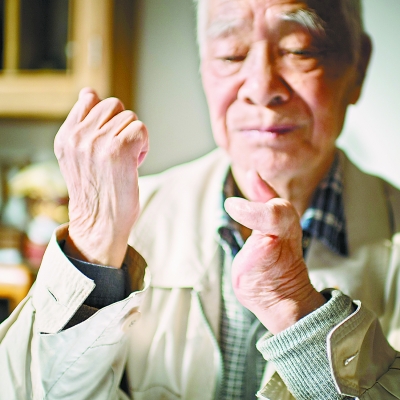92-year-old Bai Bujia
 0 Comment(s)
0 Comment(s) Print
Print E-mail China.org.cn, June 1, 2015
E-mail China.org.cn, June 1, 2015
The days of the revolution in Yan'an are still vivid in the memory of 92-year-old Bai Bujia, who firmly believes that it is in Yan'an that his pride, bravery and passion lie.
 |
|
Bai Bujia, aged 92, still recalls his unforgettable time in Yan'an. |
Yan'an was the city where Pei Pujia joined the army, resisted against the Japanese invaders, learnt Russian and changed his name into Bai Bujia. It was a turning point in his life.
Bai Bujia, aged 92, still recalls his unforgettable time in Yan'an. Patriotism and heroism were deeply rooted in his heart when he was young, since his uncle, Pei Jiantang participated in the revolution and died in the war. "My uncle was a true hero with iron determination and his encouraging words in his letters always inspired me during hard times," Pei recounted passionately.
In 1937, the Eight Route Army (led by the Communist Party of China during the Anti-Japanese War) won the first battle against Japanese invaders at Pingxingguan, boosting the morale of the national troops and people. Living in a secluded village of Shanxi, far from Pingxingguan, Pei was thrilled when he found out about the victory and therefore resolved to join the army and join the Communist Party of China to protect his motherland from war.
Pei didn't tell anybody about his intention to go to Yan'an except his nephew, Pei Yonghe, a trustworthy friend of his own age. Yonghe was supportive without the slightest hesitation. The two young men pretended that they were studying in Xi'an to stop their parents worrying. The day they departed, Pujia's mother sent him off with grief and gave 20 yuan (US$3.22), her entire life savings, to him. With money and dreams in their heads, they set off on the road of revolution to Yan'an.
Protected by comrades in secret, Pujia and Yonghe managed to contact the Eight Route Army in Xi'an. They were not accepted at first and were told to take part in training for new recruits in the northwest battlefield. "It was more like a test than training," Bujia said. "We were taught to sing patriotic songs which ignited great passion in us." After the training, Pujia and Yonghe were sent to different areas, and became parted forever.
Pujia was excited about everything in the training even though life was difficult. Inspired by touching and inspirational anecdotes during the war, he began to see himself as a soldier and increasingly craved to proceed to Yan'an, the birthplace of the Communist Party of China. Fortunately he was chosen as one of the 30 members sent to Yan'an at the age of 14. Even today, Pei still regards the journey from Xi'an to Yan'an as the most pleasant one he has made.
However, the months of walking seemed endless, torturing all of the recruits physically and mentally. Though his shoes were worn out, his feet were swollen and bleeding and his skin chapped, Pujia kept his spirits up at the thought of his destination: Yan'an. The closer he came to Yan'an, the stronger his enthusiasm became. In the end, some of the recruits made the journey while the rest gave up on the road.
In Yan'an Pei changed his name into Bai Bujia, partly for reasons of confidentiality and partly in memory of his home. Though he was eager to go into battle, Bai was forced to join the division of literature and art. At first he was reluctant to accept the job until one day an officer convinced him that every job should be equally valued as long as it contributed to winning the war. Finally he joined the renowned opera troupe "Flames."
Because of his accent, Bai rarely performed on stage but spared no effort in the backstage work. The flames of revolution were raging across the country, and so was the troupe "Flames." "We boosted the morale of the soldiers and people by singing patriotic songs and acting out dramas based on true stories," said Bai proudly, "Every time I saw the audience immersed in the play with tears streaming down their faces, I believed I was standing at the frontline of the battle." He was a true witness of the violence and atrocity committed by the Japanese aggressors when they destroyed numerous beautiful villages. Therefore he was always burning with righteous ardor and constantly encouraged soldiers and audiences with his enthusiasm and willingness.
Bai also attended college in Yan'an, majoring in Russian. Working hard day and night, he managed to become a Russian army interpreter. He did not leave Yan'an until the Japanese invaders were defeated in 1945, then he was transferred to northeast China. After getting wounded in the war, he got married and moved to Beijing. He has never returned to Yan'an since then.
Seventy years have passed in a flash, but days of the Yan'an revolution are still vivid in the memory of the 92-year-old veteran, who firmly believes that it is in Yan'an that his pride, bravery and passion lie.






Go to Forum >>0 Comment(s)